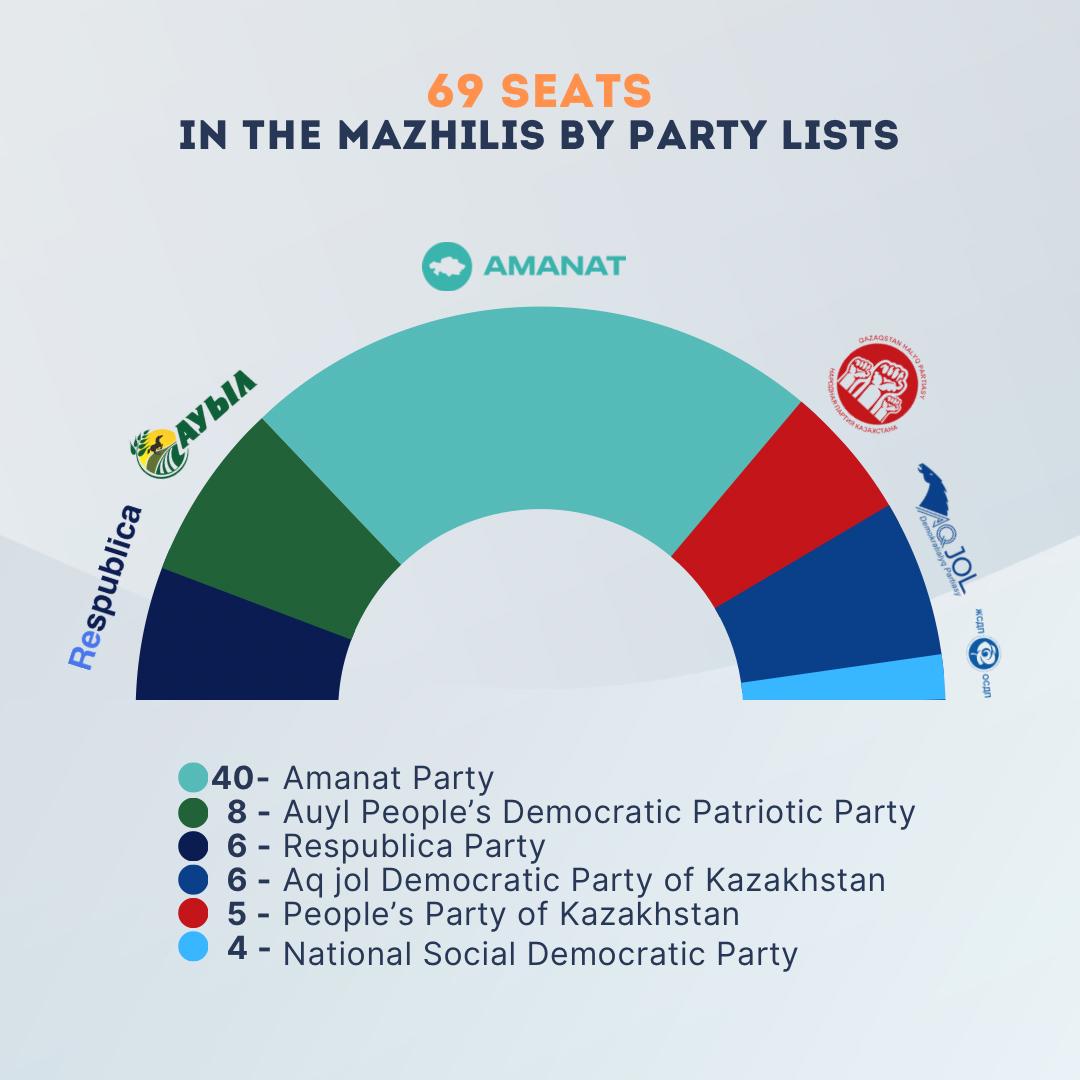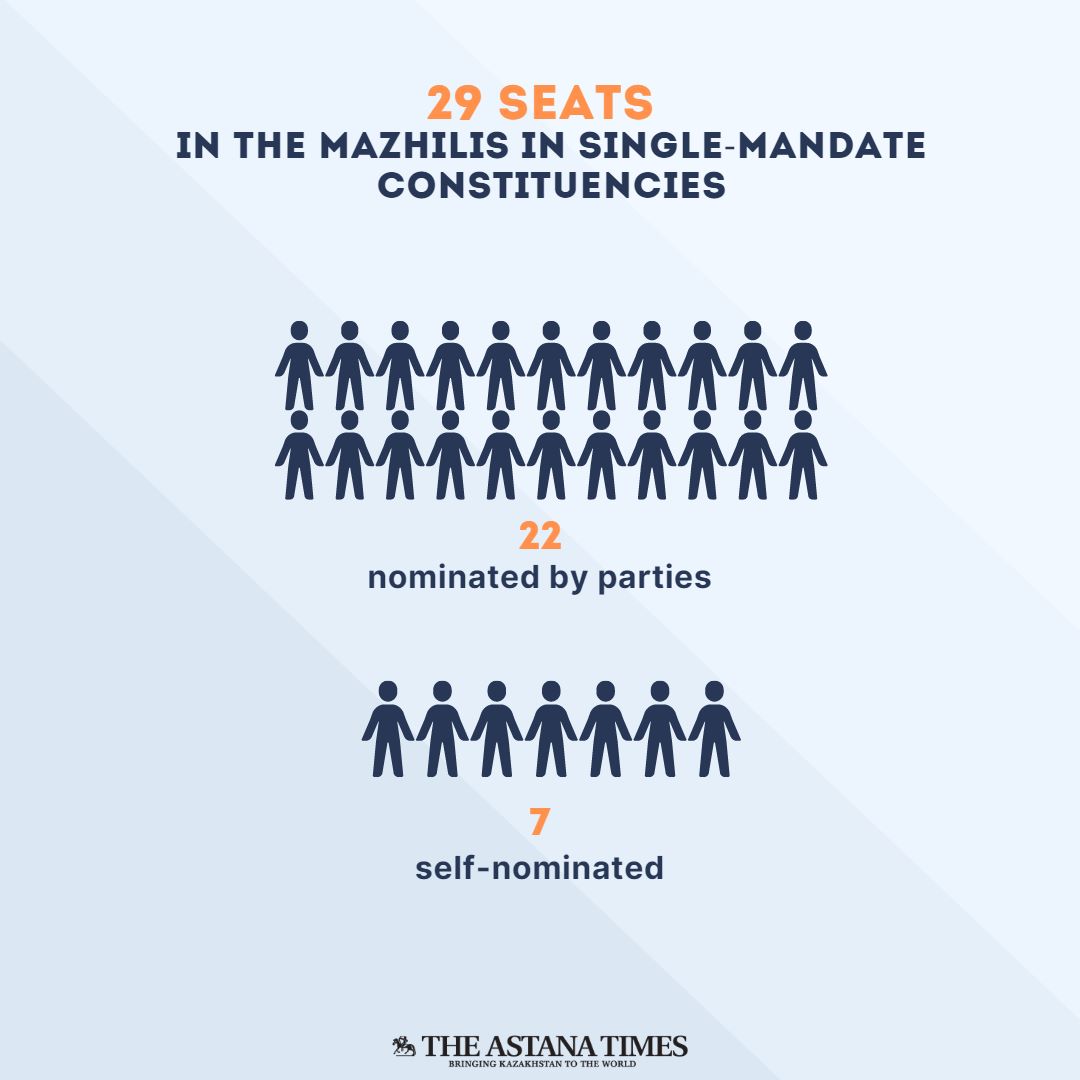As the latest parliamentary election in Kazakhstan came to a close, the nation is abuzz with anticipation for what the future holds. With the votes tallied and the final results announced, it became clear that the election had produced a mix of familiar faces and newcomers.

Assel Satubaldina, Senior Editor at The Astana Times
With the last year’s constitutional changes, Mazhilis, a lower chamber of the country’s Parliament, now consists of 98 deputies – 69 elected by party lists and 29 in single-mandate constituencies.
The election results were widely anticipated as Kazakhstan’s ruling party, Amanat, which has dominated the country’s political landscape, secured a resounding victory, winning 40 out of the 69 seats reserved for party lists.
The remaining seats were divided among five other parties, with Auyl People’s Patriotic Democratic Party winning eight. Aq Jol Democratic Party and Respublica party got six seats each, the People’s Party of Kazakhstan – five, and the National Social Democratic Party – four.
Twenty-six deputies elected by party lists have previously held seats in the Parliament, as the Kazakh legislation does not prohibit re-election. Aq Jol party leader Azat Peruashev has served the longest so far, receiving a deputy mandate since the fifth convocation in 2012.
Despite the predictable outcome of who will get the majority of seats in the Mazhilis, the election, which witnessed unprecedented competition, was still seen as a pivotal moment in Kazakhstan’s democratic journey.
It was rather a surprise that the Respublica party, registered just in January, mainly due to simplified party registration procedures, managed to garner enough votes to pass a five percent threshold. Baytaq, another new party building on the green agenda, however, failed to meet the target.

Three parties – Auyl, National Social Democratic Party, and Respublica – will be represented in the lower chamber for the first time, giving hope that the decision-making process will reflect more views and interests of citizens.
3.9 percent of the voters chose the “against all” option, which gives political parties and the state a chance to think about why they voted this way.
With the government taking steps to ensure the voting process was free and fair, international observers were invited to monitor the election. While some minor irregularities were reported, the process was seen as transparent and well-organized overall.

In their preliminary report, international observers from the Organization for Security and Cooperation in Europe (OSCE) Office for Democratic Institutions and Human Rights (ODIHR) and OSCE Parliamentary Assembly said the election offered increased choice for voters, though some limits on the exercise of fundamental freedoms and participation remain. The final report is expected to become public soon.
The election proceeded smoothly yet was marked by a rather average by international standards voter engagement. Somewhat under 54 percent of eligible voters turned out to cast their ballots.
One of the key highlights of the election was the diversity of candidates vying for 29 seats in single-mandate constituencies.
The majoritarian system existed in Kazakhstan up until 2004, when the majority of seats in the Mazhilis were distributed through this system before it was completely abolished. Under this system, the candidate who receives the most votes in the constituency is declared the winner and becomes a member of the Mazhilis.
Kazakh voters were spoiled for choice, as more than 380 candidates were vying for the 29 single-mandate seats. People recognized their friends, relatives, or neighbors on campaign posters as if politics was no longer a distant thing. Yet, just seven self-nominated candidates got seats in the Parliament, and the remaining were distributed to candidates running from parties.
The competition was the fiercest in Almaty and Astana.
Daulet Mukayev, a public figure and former Amanat party member, and Daulet Turlykhanov, Kazakh Greco-Roman wrestler, a 1989 world champion, a 1995 European and Asian champion, and a silver (1988) and bronze (1992) Olympic medalist, represent the capital city of Astana in the Mazhilis. Turlykhanov was running from Amanat.
Almaty, Kazakhstan’s largest city, is represented by Yermurat Bapi, a prominent journalist and public figure, Yerlan Stambekov, an economist and public activist, and Bakytzhan Bazarbek, a lawyer and expert in the field of land law. All three were self-nominated candidates.
The introduction of a quota system in 2021 was designed to ensure a more representative parliament, with at least 30 percent of party lists reserved for women, youth, and people with disabilities. First endorsed in 2021, the parties did manage to meet this quota, yet almost all failed to meet it when forming fractions.
In this election, the quota was extended to people with disabilities and was also applied to the distribution of deputy mandates. Amanat party, in its statement, said 32 percent of its party fraction in the Mazhilis are women, young people, and people with disabilities.
The election results have met different reactions from the public, with some expressing satisfaction at the diversity of voices now represented in the Parliament, while others showing concerns over the dominance of established parties. Still, the overall sentiment is one of optimism and hope for a better future for the country.
Whether it is about rising prices, increasing incomes, shortage of water and energy, need for quality medical services in rural areas, or poor air quality in big cities, the newly elected deputies embark on an important duty to help address a wide array of issues that matter most to the people.

